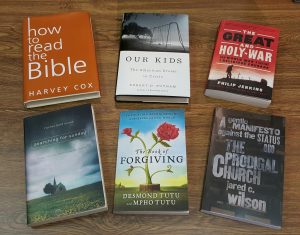 This month my reading list included many volumes that challenged my thinking and expanded my knowledge. Shown below are my ratings for the new volumes (those published in 2015):
This month my reading list included many volumes that challenged my thinking and expanded my knowledge. Shown below are my ratings for the new volumes (those published in 2015):
- (5+) Our Kids: The American Dream in Crisis by Robert Putnam (Simon & Schuster)
- (5) How to Read the Bible by Harvey Cox (HarperOne)
- (4.5) The Great and Holy War: How World War I Became a Religious Crusade by Philip Jenkins (HarperOne)
- (4.5) Searching for Sunday: Loving, Leaving and Finding the Church by Rachel Held Evans (Nelson Books)
- (4) The Book of Forgiving: The Fourfold Path for Healing Ourselves and Our World by Desmond Tutu & Mpho Tutu (HarperOne)
- (3.5) The Prodigal Church: A Gentle Manifesto Against the Status Quo by Jared C. Wilson (Crossway)
So What?
The Bible is significant for those who follow the Way of Jesus. Harvey Cox’s How to Read the Bible is the ideal introduction for personal study or use in a class or small group setting. Recognizing that while most Christians are not academics or scholars nor are most seeking to start a journey to become such, Cox believes that all Christians can and should benefit from the best modern scholarship. Seeking to help this group of readers grow in their appreciation and understanding of the biblical text, he proposes a spiritual approach that builds a bridge between traditional Bible study and biblical studies. Each chapter focuses on a mode of historical research (e.g., empire studies, redaction history, narrative theory, etc.) through the exploration of a biblical book. Additionally, each chapter contains numerous study tips for those seeking to expand the experience.
American has long been known as a land of opportunity and nation marked by the American Dream. Robert Putnam’s Our Kids: The American Dream in Crisis describes changes that are limiting the likelihood of a group of children from achieving the American Dream. More specifically, the widening gap in formation opportunities for children through strong families, schools and communities (from the 1950s on) appears to be the primary reason for a class divide (and those in the lower class face significant challenges that make them far less likely to achieve the American dream). While the widening wealth gap and income gap between the haves and have nots is well documented, Putnam digs much deeper illustrating how the widening has occurred in many other areas through a powerful combination of narrative story telling alongside substantive survey data. Putnam suggests that many of these differences are determined very early in a child’s life, thereby suggesting governmental funding is best directed at interventions targeting young children and their families. While few readers are likely to agree with Putnam’s proposed solutions, all should appreciate an opportunity to engage in meaningful conversation about what is needed to ensure that all children have opportunities to thrive and to achieve the American Dream.
- Share one class, book, or other learning experience that has significantly shaped your understanding of how to study the Bible.
- Share one way your local community of faith is involved in helping children from lower socioeconomic status households have richer experiences of resources linked to future success, including parenting, education, and community support.
- Share the most recent book you read, and one reason why you would or would not recommend it to others.